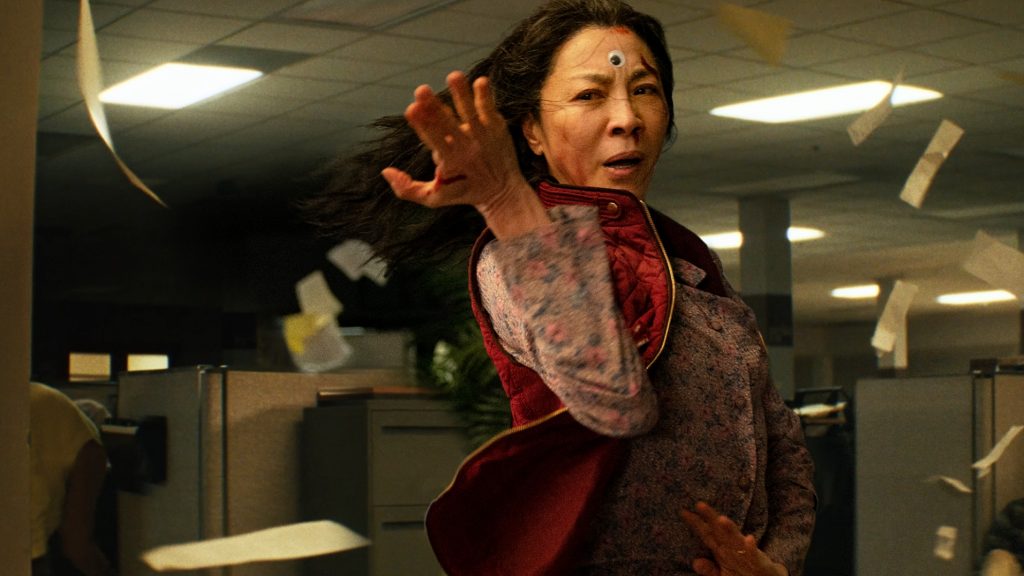Removing the scientific jargon and overwhelming explanations, the concept of multiverse is simple, at least in the literary and audiovisual art: There’s a parallel universe where you have a different career, friends, partner, and destiny. Such a thought-provoking premise that could exploit a storyteller’s imagination, however, recently became banal.
Ironically, the recent films using multiverse as their plot device took out the exciting values of imagination and uniqueness from such concepts, replacing them with crossovers and cameos from multi-billion-dollar franchises. Everything, Everywhere, All at Once , the latest effort from the duo Daniel Kwan and Daniel Scheinert, or credited as the Daniels, fortunately, is the audience’s needed break from the tiring exploitation of the multiverse concept.
Everything, Everywhere, All at Once, a philosophical visual treat-cum-love letter to genre cinema confidently showcases the Daniels’ creative minds with fresh, intriguing story about family issues, generational trauma, acceptance, disintegrating love, nihilism, existentialism, suffering, googly eyes, taxes, and laundry. If it sounds like a mess on the paper, it’s also an unapologetically, delightful, and celebratory, mess on screen.

Even before the visual demonstration of the parallel universes, we see the multiverse of Evelyn Wang (Michelle Yeoh) through her piles of tax receipts: she is an author, a singing coach, a cook, etc. Her tax auditor Deirdre (Jamie Lee Curtis) said she just doesn’t see them as receipts but as stories that show the real life of a person. Evelyn’s tax receipts are her hidden frustrations as her life as a laundry store owner is as dull as spinning wet clothes inside a dryer machine. What if she didn’t elope from China to the U.S. with her husband Waymond (Ke Huy Quan)? What if she didn’t have to raise her queer daughter Joy (Stephanie Hsu) who is cold to her? Will that make her more successful and less stressful about taxes, laundry, and family issues?

Before her family’s appointment with Deidre, Evelyn had an odd experience. While they were on the elevator, the soft Waymond suddenly became snappy like a secret spy, opened the umbrella to block the CCTV, and identified himself as “Alpha Waymond” to the confused Evelyn. Alpha Waymond gave her a set of instructions, including switching her shoes from one foot to the other. Confusing as it may sound, the comical oddness of the film should not come off as a surprise from the Daniels, the minds behind the farting corpse in the 2016 film Swiss Army Man and the literally groundbreaking butts in the 2013 DJ Snake and Lil Jon music video Turn Down for What. Just like their previous efforts, the Daniels exhibited their funny fascination on butts in this film.

Alpha Wang eventually told Evelyn that she can defeat the multiverse-threatening Jobu Tupaki (or Jobi Chewbacca? However Asian moms mispronounce names) because unlike the other versions of Evelyn (martial artist/actress, blind singer, Teppanyaki chef among others), she failed to achieve something special. Then how is she going to defeat the supposedly villain?
The Daniels examined the flaws and pain of being a human with flashy visuals, gestures to classic films such as The Matrix, In the Mood for Love, and Ratatouille, while injecting the philosophical thinking of Albert Camus and Friedrich Nietzche. The film’s editor Paul Rogers matched the script’s eccentric story with sharp and eye-popping match cuts and montage of “verse jumping” to further emphasize the wit, humor, and heart of the film. When the film gets all over the place, it immediately cuts to a five-minute calm silence of the version of the Earth sans life. The film knows exactly when the audience needs to breathe.
Amid all these impressive feats, the film’s biggest achievement is showcasing the excellence of Yeoh. As the confused and overwhelmed Evelyn, Yeoh exhibits the rich emotional depth of her character, eliciting laughter with her almost-perfect, organic comedic timing and tears and sympathy from her nuanced dramatic chops. The character of Evelyn was initially written as a guy tailor fitted for Chinese action star Jackie Chan. In another universe, he stars in this film but in this one we’re living in, we should be grateful that we are all witnessing the underrated acting range of Yeoh.
After all of the shenanigans, Jobi Tupaki showed Evelyn the seemingly unthinkable truth: nothing matters. But it was not packaged as a pessimistic, depressing mindset when Jobu Tupaki said it in a slow, calm-inducing manner. But if nothing matters, then what is stopping us from breaking the rules and traditions? Why can’t we be more emotionally open and susceptible to the impacts of embarrassment, pain, and harsh reality? Why can’t we just put googly eyes on everything?
Everything, Everywhere All at Once is now in theatres.




